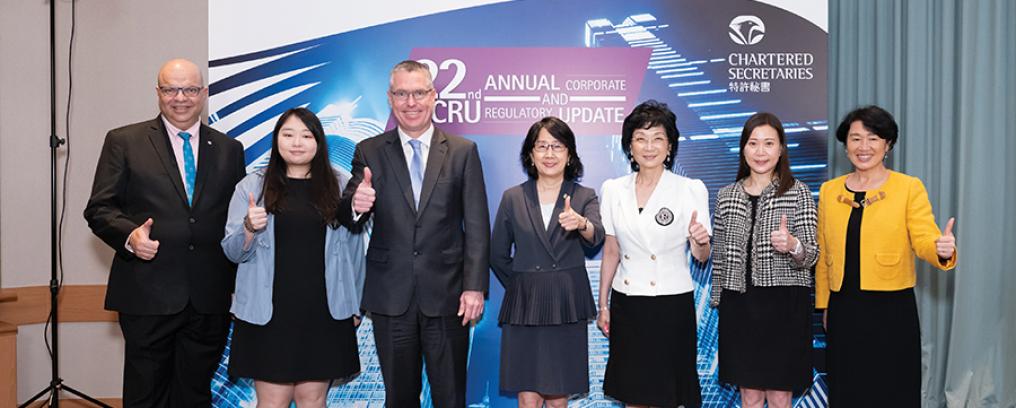This third and final part of our review of the Institute’s 22nd ACRU webinar highlights the insights shared at the forum on compliance with Hong Kong’s corporate disclosure requirements, and its upgraded and expanded anti-money laundering and counter-financing of terrorism (AML/CFT) regime.
Compliance with Hong Kong’s corporate disclosure regime is always high on the agenda of governance professionals. At the Institute’s latest ACRU webinar, speakers from the Securities and Futures Commission (SFC) revealed that nearly half of SFC listed company investigations involve false or misleading financial statements. Similarly, AML/CFT compliance is an area of practice governance professionals need to keep up to date with, particularly those working in the trust or company service provider (TCSP) sector. There has been a significant strengthening of AML/CFT regulations in Hong Kong and tighter supervision of the TCSP sector to meet international standards.
This final part of our review of the Institute’s 22nd ACRU webinar highlights some takeaways from the discussions of these two areas of practice.
Corporate disclosure
Disclosure of corporate loans
This year a high number of companies failed to meet the deadline for reporting their annual results – for companies with a December 2020 year-end, this deadline was by the end of March 2021. Often, this failure related to the inability of the auditors to complete their audit due to a lack of evidence to justify the commercial rationale for loans, guarantees, prepayments and receivables.
Benjamin Cheuk, Director, Corporate Finance Division, SFC, pointed out that these developments are indicative of a number of governance failures relating to loans. These include:
- the loans in question involved no security and no collateral – sometimes they didn’t even involve interest payments
- the loans were approved without any evidence to show that the listed issuer had done any reasonable credit assessment
- there were poor internal controls relating to the loan approval process
- there were multiple extensions of the loan repayment without good reason, and
- in some cases, the money loan amount did not go to the named borrower’s account, raising doubts as to the identity of the real borrower.
Mr Cheuk highlighted similar concerns relating to prepayments. In a number of cases the SFC looked at, the prepayments were not subject to interest payments and sometimes no goods were actually delivered as a result. In essence, these prepayments were actually loans to parties purporting to be suppliers. In other cases, large amounts of money were paid upfront to counterparties who signed a memorandum of understanding (MOU) with the company. An MOU, Mr Cheuk pointed out, is not legally binding, so there does not seem to be any commercial rationale for companies to pay large amounts of money as a ‘prepayment’ without any safeguards regarding the recoverability of these payments.
In terms of receivables, the SFC has encountered more than one case where companies sold valuable assets, sometimes to a connected party, without actually collecting the money. The due payment then became a ‘receivable’ in the accounts for a long period of time. The auditors would then raise questions as to the recoverability of the payment. Mr Cheuk’s team noted an alarming lack of enthusiasm to recover the money, probably on the basis that the person who received the asset was a connected party.
Regarding guarantees, Mr Cheuk acknowledged that issuing guarantees for loans can serve a commercial purpose – for example, where companies issue guarantees for loans to meet the funding needs of suppliers. However, such guarantees expose the listed company to a credit risk. In a number of cases, the SFC investigated guarantees that were given to controlling shareholders or directors without the knowledge of the board or the board’s approval. Mr Cheuk emphasised that the SFC needs to see due diligence and a commercial rationale when companies expose themselves to these credit risks.
Hong Kong Exchanges and Clearing Ltd (HKEX) has also been active in this area of enforcement. Jeffrey Ho, Assistant Vice-President, Listed Issuer Regulation, Listing Division, HKEX, pointed out that the governance failures highlighted above have been a major theme of the latest HKEX Annual Report Review Programme (ARRP). He said these failures are symptomatic of internal control failures and a failure of directors to properly discharge their fiduciary duties in lending transactions.
Disclosure of the identities of counterparties
The disclosure of the identities of counterparties involved in notifiable transactions is another area of concern for regulators in Hong Kong. The SFC has observed a number of unfair or overvalued acquisitions of businesses by listed companies where there was inadequate disclosure of the identities of the counterparties involved. Often the corporate announcement of the acquisition would name a legal vehicle without disclosing the identities of the ultimate beneficial owners of the vehicle.
Patrick Yu, Senior Vice-President, Listed Issuer Regulation, Listing Division, HKEX, highlighted HKEX concerns relating to this issue. He warned that HKEX has seen a number of instances where compliance with Main Board Listing Rule 14.58 (GEM Rule 19.58), which requires issuers to disclose the identity of the counterparties to a notifiable transaction, had been followed in the letter rather than the spirit. He pointed out that, where the counterparty is a legal vehicle or an investment fund, investors may be completely in the dark about the significance of the transaction. They will legitimately want to know who negotiates on behalf of the company, or who exerts influence on it.
Guidance issued by HKEX in October 2019 points out that, in such cases, issuers need to disclose the identity of ultimate beneficial owners of the legal vehicle or investment fund. Mr Yu added that notifiable transaction announcements need to also give sufficient information relating to any relationship between the counterparties and connected persons. ‘If the relationship gives rise to concerns that the connected person was in a position to exercise significant influence over the issuer on the transaction, we may deem the counterparty as a connected person,’ Mr Yu said.
Disclosure of Covid impacts
Covid has had a major impact on listed companies in Hong Kong and both the SFC and HKEX have been encouraging more quantitative disclosure of these impacts. William Wong, Head of Accounting Affairs, Listing Division, HKEX, highlighted the findings of the HKEX’s latest ARRP in this regard.
The ARRP report, published in January this year, recommends issuers to make quantitative measures of the impact of Covid on operations, financial performance and financial position, and an assessment of the risks and impact on their future performance. This should include assessments of the liquidity positions and working capital sufficiency with reference to issuers’ operations and capital commitments, and measures such as cost control, funding and adjustments to business plans taken or to be taken to manage the impact of the Covid-19 pandemic.
Mr Wong added that issuers should continuously evaluate the situation and, where appropriate, announce material business developments to keep shareholders and investors informed on a timely basis. ‘In view of the Covid-19 pandemic and its economic effects, investors need high-quality financial disclosure more than ever. Issuers should have in-depth conversations with their auditors, either at an early stage or throughout the audit, and stay alert to the changes to the financial reporting and auditing standards, as well as the recent standard developments and guidance materials provided by the local and international standard setters on their designated websites,’ Mr Wong said.
Profit warnings
Mr Cheuk of the SFC, also highlighted the SFC’s concerns regarding the poor quality of corporate profit warnings. He pointed out that the practice of warning the market that ‘profit’ is expected to record a decrease of over 100% simply doesn’t make sense. If profits have fallen over 100%, the company is actually reporting a loss and the language here is really an attempt to give a false impression that the company is still making a profit.
AML/CFT compliance
As mentioned above, AML/CFT compliance is a key part of the work of governance professionals in Hong Kong, particularly for those working in the TCSP sector. Two speakers from the Companies Registry presented at this year’s ACRU to update practitioners on the latest developments in this area.
Ida Lee, Deputy Registry Manager, Registry for Trust and Company Service Providers, Companies Registry, focused on the compliance obligations of TCSPs under the licensing regime regulated by the Companies Registry. She highlighted some major points regarding the application for renewal of a TCSP licence and some common misconceptions of the statutory requirements governing Hong Kong’s TCSP licensing regime – the Anti-Money Laundering and Counter-Terrorist Financing Ordinance (AMLO).
Applicants applying for a TCSP licence must not start carrying on a trust or company service business before the licence is granted. Moreover, licensees are required to put in place adequate and proper AML/CFT policies, procedures and controls. ‘TCSP licensees are required to assess the money laundering and terrorist financing risks of their businesses and customers. They also have to develop and implement policies, procedures and controls on the relevant aspects of risk assessment and customer due diligence (CDD) measures,’ she said.
The CDD measures should be carried out by a TCSP licensee:
- before establishing a business relationship with a customer
- before conducting any occasional transaction that involves an amount equal to or exceeding HK$120,000
- when the licensee suspects that the customer or the customer’s account is involved in money laundering or terrorist financing, and/or
- when the licensee doubts the veracity or adequacy of any information obtained.
Basic CDD measures include identifying the customer and verifying the customer’s identity and that of the customer’s beneficial owner, and obtaining information on the purpose and intended nature of the business relationship to be established with the TCSP licensee.
Ms Lee also drew the attention of ACRU participants to the first condition of a TCSP licence requiring the licensee to appoint a compliance officer (CO) and a money laundering reporting officer (MLRO) during the term of the licence and to ensure that a new CO or MLRO be appointed within seven days if a vacancy occurs in either of the posts. Licensees are required to notify the Registrar of Companies of the resignation and appointment of these officers within one month of the change taking place.
Ms Lee reminded TCSP licensees to comply with statutory requirements under the AMLO for reporting changes of particulars of a licensee which is a corporation. They should observe their obligations under the AMLO as well as the filing requirements under the Companies Ordinance.
The second speaker from the Companies Registry, Roger Wong, Deputy Registry Manager, Company Formation and Deregistration Division, Companies Registry, focused his presentation on e-incorporation.
Mr Wong pointed out that only about 7% of incorporation applications were received via e-submission when the Companies Registry’s e-incorporation service was first introduced in March 2011. Currently almost 60% of incorporation applications are received via the electronic route. He reminded ACRU participants how Covid had changed the way people work and how they can benefit from the ‘anywhere and anytime’ ethos of the Companies Registry’s e-services. Moreover, e-incorporation is quicker and cheaper – it takes four working days to complete the processing of a paper application and costs HK$1,720, whereas e-incorporation takes less than one hour and costs HK$1,545.
Mr Wong walked through the e-incorporation process with ACRU participants, demonstrating the efficiencies to be gained by taking this route, including the automatic generation and filling in of the relevant forms and facilitations for frequent users. He encouraged participants to use the e-incorporation service if they are still using paper forms for company incorporation.



